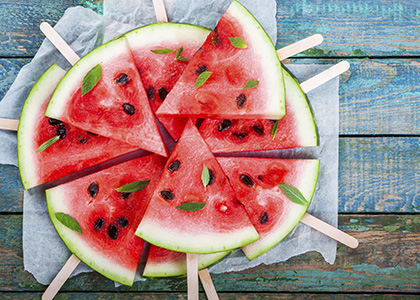
Add More Watermelon to Your Plate this Weekend
By Claire Georgiou, Reboot Naturopath, B.HSc ND
Who doesn’t love biting into a cold, juicy wedge of watermelon? It’s a crowd favorite all over the world and a base for one of Joe’s favorite juice recipes. Watermelon is in season in the summer which is also when it contains its highest nutrient content best in summer although it can be available in some areas all year round. When consumed in season it is tastier and higher in nutrients (learn more about that here).
With 92% made up of water, it’s a very refreshing and hydrating fruit to consume with a high nutritional profile. Let’s look at what one wedge can give us: 86 calories, 1 g of fiber, 2g of protein, 33% of your daily vitamin A, 39% of your vitamin C recommendation, contains vitamin B1, B5 and B6 with smaller amounts of the other B vitamins, and 320mg of potassium which supports its fantastic hydrating benefits along with other electrolytes such as calcium and magnesium.
Watermelon contains phenolic compounds including flavonoids, carotenoids, and triterpenoids. The carotenoid content of watermelon includes lycopene (actually twice as much as tomatoes!), beta-carotene, lutein, zeaxanthin and cryptoxanthin. In one study it showed that lycopene from raw watermelon juice was absorbed as well as the lycopene from heat-treated tomato juice which is supposed to be the most optimal way to consume lycopene.
Here’s a fun fact for you: The brighter the flesh and deeper the color, the stronger the lycopene and antioxidant content. Most of the lycopene forms when the fruit is in its last stages of ripening, research on uncut watermelon shows that lycopene content may even increase during room temperature storage for the first week.
Here are more specifics on its benefits.
Blood Pressure and Cardiovascular Health
A study published by the American Journal of Hypertension found that watermelon extract reduced ankle blood pressure, brachial blood pressure and carotid wave reflection in obese adults with prehypertension or stage 1 hypertension and it also improved arterial function.
Watermelon contains an amino acid called L-citrulline, rarely found in other fruits, that helps to open up the blood vessels by creating an increase in nitric oxide which supports muscle wall relaxation including the smooth muscle in blood vessel walls.
In one study that was published in the American Journal of Neurology, they found that men with the highest blood levels of lycopene were 55 % less likely to have a stroke than those with the lowest readings. While another study showed that lycopene decreased stroke risk by more than 19%.
Post-exercise
Watermelon and watermelon juice has been shown to help improve exercise performance and reduce post exercise fatigue and soreness post-exercise due to the L-citrulline content. The potassium and magnesium content is also helpful for muscle soreness and relaxation after your sweat session.
Anti-inflammatory
Due to the naturally occurring antioxidants such as lycopene, carotenoids and vitamin C, watermelon may help reduce free-radical and cellular damage. Lycopene and the other antioxidants work to reduce the incidence of prostate cancer, lung, stomach, colon, ovarian and pancreatic cancer. In one small study it showed that watermelon juice reduced oxidative damage in mice exposed to low-dose radiation.
Sun Protection and Healthy Hair and Skin
Due to the lycopene content, watermelon has some sun-protective nutritional properties along with providing nutrients such as vitamin A and C that are specific for supporting healthy hair and skin.
Post-illness
Due to its naturally sweet taste and hydrating benefits, watermelon can be a great first food if you are just getting over a stomach bug or feeling nauseous. Watermelon contains natural sugar for energy, plus loads of fluid along with electrolytes. It’s the perfect get-well food for anyone.
Immunity
Vitamin A and the other antioxidants in watermelon help to support a healthy respiratory mucosa for infection protection and vitamin C for white blood cell strength and activity.
The rind can be enjoyed and interestingly contains high amounts of the amino acid citrulline which is associated with reduced muscle soreness, vasodilation and possibly improved fat metabolism. The seeds also contain some minerals such as zinc and iron and can be eaten as well.
Enjoy the many benefits of watermelon with these delicious recipes: